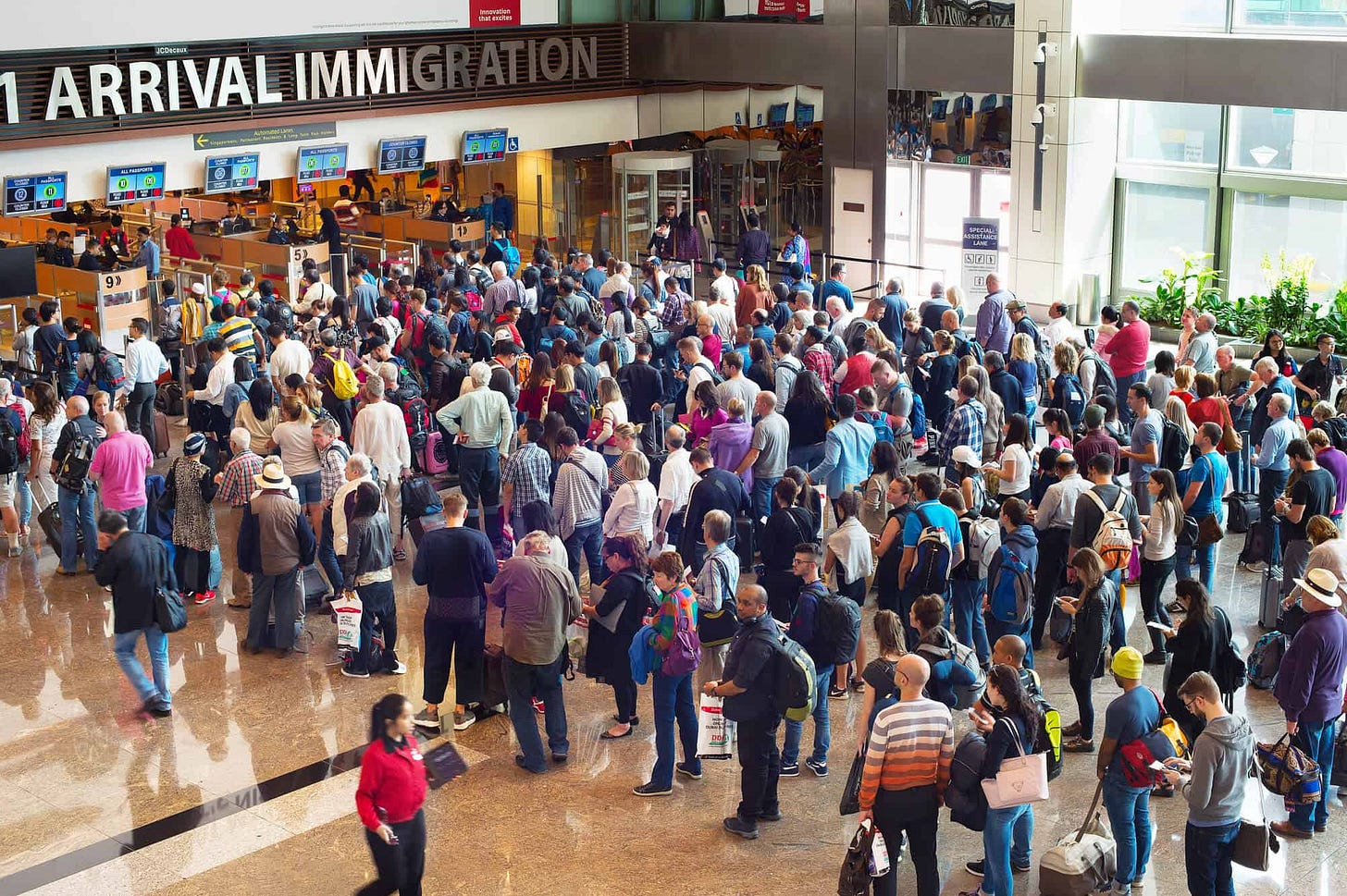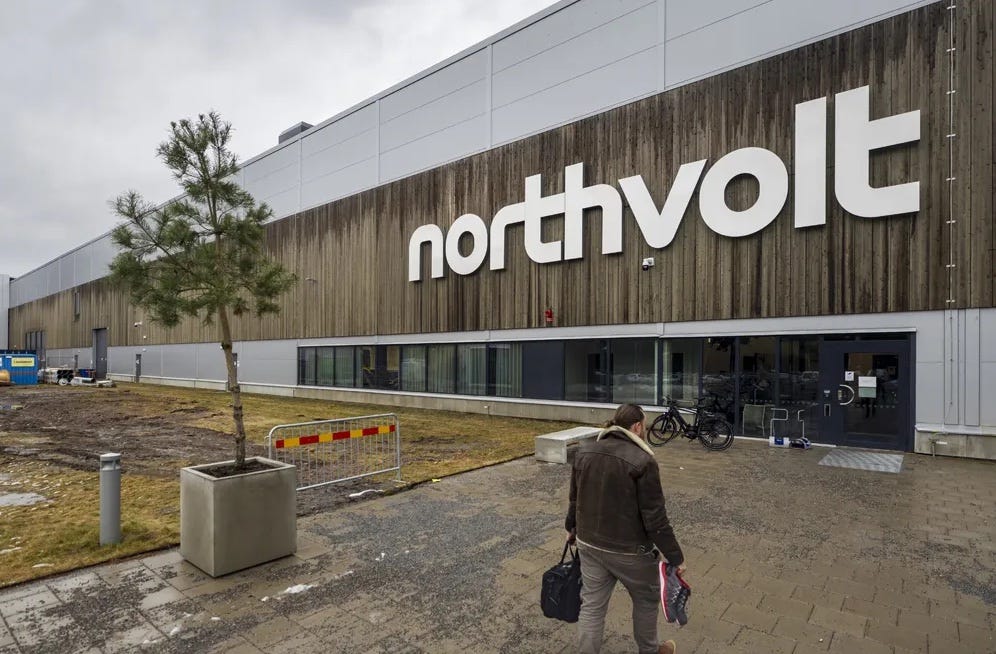Good morning, It’s Tuesday, April 1st. In today’s news, Canada’s 100 million population plan and mass migration lies are exposed, Carney announces a housing plan and Poilievre pledges national energy corridor, Carney backs the Liberal MP who promoted a CCP bounty on Conservative opposition, Trump says reciprocal tariffs will ‘start with all countries,’ and much more.
First time reading the daily blend? Sign up here.
Canada’s 100 Million Population Plan: The Lie Behind Mass Migration
We were sold a lie—that mass migration is about compassion, diversity, and enriching our nations through multiculturalism. But when you scratch the surface, it becomes clear: this isn’t about kindness. It’s about economics, control, and elite convenience. Let’s paint a more accurate picture—using Canada as the case study.
In 1960, Canada had a birth rate of over 27 births per 1,000 people. Today, that number is under 10. That’s not a gentle decline—it’s a demographic cliff. And it started right after the widespread adoption of birth control, paired with a cultural shift that told women liberation meant working 40–50 hours a week.
Now, let’s be clear before the Handmaid’s Tale crowd starts screaming—this isn’t a pitch for public policy on family planning or forcing anyone back into the kitchen. But we do need to ask who benefitted from this shift. While it was sold as social liberation, it conveniently flooded the labour market, suppressed wages, and drove inflation. Dual-income households competed for the same goods and homes, driving prices higher and lining the pockets of the wealthy. What looks like progress might just be a well-dressed psy-op.
Here’s the math problem: if a population stops reproducing, it stops growing. But in a country like Canada, with a massive welfare state, you need a growing base of young workers to support aging retirees. Pensions, health care, and social programs don’t fund themselves. And if birth rates can’t keep up, governments look for the next best solution: mass migration.
In 2000, the UN openly proposed this in a report titled Replacement Migration. It argued that to counter an aging population, Western nations would need to bring in tens—even hundreds—of millions of migrants. This wasn’t hidden. It was public policy planning.
Enter Canada’s Century Initiative—a lobby group co-founded by former Liberal insiders Dominic Barton and Mark Wiseman. Their goal? A Canada of 100 million people by 2100. Not through births, but through immigration. The Globe and Mail says we’re “on track,” and the data backs it up. From 2021 to 2023, Canada’s net migration skyrocketed to over 1.2 million per year—an unprecedented spike in modern history.
And who’s now running the show? Mark Carney—former Bank of Canada governor, WEF insider, and newly-installed Prime Minister. One of his first moves? Adding Mark Wiseman—yes, the Century Initiative co-founder—to his Canada-U.S. advisory council. The connections aren’t subtle. They're systemic.
So who really benefits from all this? Not Canadians. Not immigrants. The only winners are what should be referred to as the Unholy Trinity:
Government, which expands its power and manufactures a one party state with a foreign and loyal electorate.
Corporations, which suppress wages by increasing labour supply while inflating profits through higher consumer demand across housing, goods, and services.
Organized crime, which thrives in the chaos—taking advantage of overwhelmed systems to smuggle drugs, traffic humans, and move money under the radar while law enforcement falls further behind.
Mass migration isn’t about compassion. It’s about patching a broken economic system, preserving elite dominance, and leaving the rest of us to pay the price.
Election Update: Carney Announces Housing Plan, Poilievre Pledges National Energy Corridor
Liberal Leader Mark Carney has pledged over $35 billion to double housing construction, aiming for 500,000 new homes per year through a new federal developer, Build Canada Homes (BCH). The plan would see the government take a direct role in building homes, providing $25 billion in financing to prefab homebuilders and $10 billion for "deeply affordable" housing for students and seniors. Carney also claims he will cut red tape by halving municipal development charges and reviving a 1970s tax incentive to spur rental construction.
But here’s the problem: the Liberals have been making similar promises for nearly a decade and have little to show for it. Since 2015, they've pumped billions into housing programs, yet housing costs have skyrocketed, and construction has lagged far behind demand. Their much-hyped Housing Accelerator Fund hasn’t delivered a significant boost in supply, yet Carney plans to “double down” on it. If Trudeau’s government couldn’t meet its housing goals with years of Liberal policies, why should Canadians believe Carney will?
Meanwhile, Conservative Leader Pierre Poilievre has taken a different approach, vowing to scrap ineffective Liberal housing programs like the Housing Accelerator Fund and the $6 billion Canada Housing Infrastructure Fund. Instead, he’d eliminate the federal sales tax on new homes up to $1.3 million, a direct measure to lower costs and incentivize private sector construction.
On infrastructure, Poilievre announced a National Energy Corridor to fast-track pipelines, railways, and transmission lines, ensuring Canada can move its resources efficiently and reduce reliance on the US. He slammed the Liberals for failing to approve 16 major energy projects and 18 LNG plants, despite Canada’s vast resources. His plan would pre-approve projects using a “shovel-ready” model with upfront environmental and community assessments, ensuring certainty for investors and involving First Nations from the start.
Carney, on the other hand, responded with a vague “First Mile Fund” and a “One Window” approval process, promising to streamline infrastructure projects. But given the Liberals’ track record of delays, regulatory roadblocks, and policy reversals, this sounds like more bureaucratic tinkering rather than real reform. After a decade of broken promises, Canadians have every reason to doubt that another round of Liberal spending will solve the very problems they helped create. More
Liberal MP Backs CCP Bounty, Carney Backs the MP—Welcome to China, Eh?
Paul Chiang, the Liberal MP for Markham–Unionville, was quoted in a Chinese-language outlet saying, “If you can take him to the Chinese Consulate General in Toronto, you can get the million-dollar reward,” referring to a CCP bounty on Conservative candidate Joe Tay.
When asked if Chiang would be removed from the Liberal slate, Carney called the comments “deeply offensive” and a “terrible lapse of judgment”—but ultimately decided to keep him on. Carney emphasized Chiang’s 28-year police career and his apology, insisting that was enough.
This from a man who has praised China’s leadership and long-term vision. “It’ll be important that China is center stage to shape this new global, sustainable financial system,” Carney once said. He’s called the CCP’s leadership “ambitious” and lauded its strategic discipline.
Conservative leader Pierre Poilievre took a very different view. He said the comments “may well rise to the level of criminality” and warned that Carney is “compromised,” citing Beijing’s $250 million loan to Carney’s investment firm. More importantly, he emphasized what’s at stake: a Canadian citizen’s life and the integrity of our democracy.
“This is not an off-colour joke,” Poilievre said. “It’s a call to turn over a political dissident to a hostile foreign government.”
The contrast couldn’t be starker: one leader apologizes for collaborators. The other calls them out.
A more detailed breakdown of this scandal will be published later today. Stay tuned.
Trump Says Reciprocal Tariffs Will ‘Start With All Countries,’ Rejecting Reduced Launch
President Trump confirmed his “reciprocal tariffs” plan will target all countries and take effect on Wednesday, April 2, 2025, rejecting speculation that it would focus only on major trading partners. The announcement has rattled markets, with stocks initially plunging before rebounding. While administration officials previously suggested tariffs would target 10 to 15 countries, Trump dismissed that notion. Economists warn the policy could slow growth and fuel inflation, but Trump insists it is driving an economic “transformation,” citing recent corporate investment pledges. Some countries, like Canada, are in talks for possible exemptions, but details remain unclear as the rollout approaches. More
Canadian Freedom Convoy Donations Hacker Arrested for US Cyberattack on GOP
Canadian hacker Aubrey Cottle, who took credit for leaking Freedom Convoy donor data in 2022, has been arrested and charged by the US Attorney’s Office for his role in a 2021 cyberattack on the Texas Republican Party. Cottle, 37, was arrested in Canada and faces charges in both countries. US prosecutors allege he illegally accessed and leaked sensitive GOP data, later boasting about it online. He also admitted to hacking GiveSendGo in 2022 to expose Convoy donors, leading to widespread harassment. If convicted, he faces up to five years in prison. More
France’s National Rally Leader Le Pen Barred From 2027 Presidential Election
Le Pen, whose party is a front-runner in polls ahead of the 2027 vote, also faces a potential jail sentence after being found guilty of embezzlement. More
Toronto City Councillors Pass $33,000 Pay Raise for Themselves - WTF
Kremlin Says US and Russian Companies are Getting Close in Rare Earths Partnership but Challenges Remain - Dmitry Peskov said Russia continues to face U.S. sanctions and that ’restrictions continue to apply to American companies. More
‘It Means Death’: Afghan Women’s Rights Activists Face Deportation from Pakistan - Police go door-to-door arresting Afghans as the government pledges to send millions back home to Taliban rule. More
Putin Signs Largest Conscription Campaign in 14 Years, Drafting 160,000 Men - More
US to Upgrade Military Command in Japan to Deter China - More
Northvolt Bankruptcy Leaves Billions in Taxpayer Dollars in Limbo
Quebec’s Economy Minister Christine Fréchette has confirmed that most of the taxpayer money invested in Northvolt’s failed battery plant is now lost after the Swedish parent company declared bankruptcy on March 12—Sweden’s largest corporate collapse in modern history.
The project was backed by $7.3 billion in taxpayer-funded subsidies, with $2.9 billion from Quebec and $4.4 billion from Ottawa. In addition, Quebec provided $240 million for land purchases, which Fréchette claims is secured by assets in Northvolt’s North American subsidiary. However, with the parent company bankrupt, the fate of its North American operations remains uncertain, and the total losses for taxpayers are still unclear.
A Parliamentary Budget Office report last year revealed that Canadian EV subsidies have outpaced private investment by 14%, with total taxpayer-funded spending reaching $52.5 billion—raising concerns about the long-term viability of government-backed green energy projects. More
Trump Media Becomes First Company to List on New NYSE Texas - More
France’s Antitrust Watchdog Issues Apple a $162 Million Fine - More
Scientists Create Revolutionary "Lightsail" for Interstellar Travel
Researchers from Brown University and TU Delft have developed a groundbreaking ultra-thin, light-powered lightsail designed for interstellar travel. Using AI optimization, the sail’s 200-nanometer thickness makes it highly reflective and lightweight, enabling speeds of up to 20% of the speed of light—or 215,850,570 kilometres per hour! This breakthrough could dramatically cut travel time to nearby stars like Alpha Centauri from millennia to decades. It's a major step for initiatives like Starshot, aiming to make interstellar missions feasible within human lifetimes with a cost-effective and scalable manufacturing process. More
Study: Dead Trees Keep Surprisingly Large Amounts of Carbon Out of the Atmosphere - More
An MIT-Educated Professor, the New York Yankees, and Bat that Could be Changing Baseball Forever
Aaron Leanhardt, a former MIT physics professor turned Yankees minor league hitting coordinator, developed the "bowling pin" bat to help hitters increase contact by redistributing weight from the end to the barrel. This bat design optimizes swing speed and power, resulting in faster, more powerful hits. It debuted successfully with the Yankees, helping players hit 15 home runs in their first three games. MLB teams are now interested in the design, but its long-term impact will depend on player comfort and effectiveness in actual games. More
Ovechkin Notches 890th Goal, Moving 5 Away from Gretzky's All-Time NHL Record - More
Kanye West Shows Up to Interview in Black KKK Hood and Says He 'Didn't Want to Have Kids' with Kim Kardashian - Wild
2025 NBA Playoff Picture: Here's What's at Stake in the East and West With Two Weeks to Go - More
Jessica Simpson Reveals Her Shocking Vocal Remedy: A Snake Sperm Elixir, Courtesy of Chinese Medicine
Rock Used as a Doorstop For Decades Found to Be Worth Over $1 Million - It turned out to be one of the biggest intact chunks of amber in the world
92-Year-Old Man Completes His 30th Consecutive Rome Marathon - LFG



















Re: Canadian immigration. It’s tough to refrain from being a ‘conspiracy theorist’ when these suspicions seem to keep coming true. Doesn’t Canada’s immigration situation seem to resemble at least a tiny bit the mythical Kalergi Plan?
JT’s comments to the effect that Canada has no core identity and that it is the first post-national state certainly don’t help engender faith in immigration policy.
Canada, take care of your people before importing others.